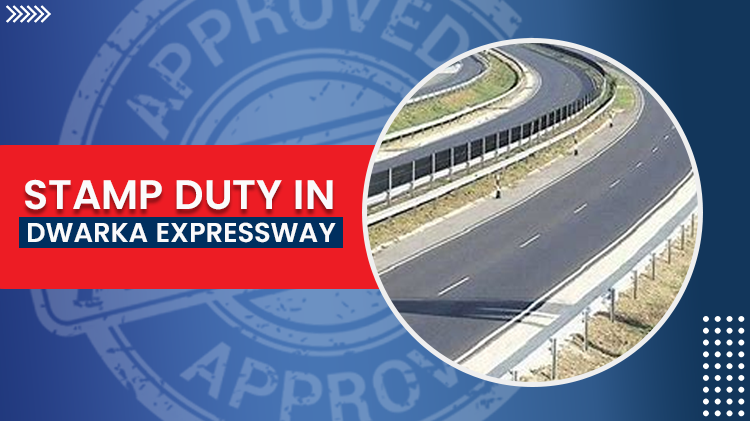Table of Contents
The Dwarka Expressway is an Indian highway that connects Gurugram, in the state of Haryana, with Dwarka, a neighbourhood in Delhi. Understanding the idea of stamp duty is essential if you’re considering buying a home or investing in this region. This blog will give you a thorough breakdown of stamp duty in the Dwarka Expressway, its effects, and the variables that go into determining its calculation.
The meaning of stamp duty
Stamp duty is a kind of tax that the government imposes on specific papers and transactions, including real estate deals. It is due when legal documents are signed or when property rights are transferred. Depending on which is higher, the tax is determined as a percentage of either the transaction value or the market value of the property. The tax levied on real estate transactions that take place within the Dwarka Expressway corridor is referred to as stamp duty in the context of the Dwarka Expressway.
The purpose for stamp duty
Stamp duty’s main goal is to validate and legalise documents in order to ensure their validity and enforceability. Property buyers and other participants in transactions contribute to the government’s revenue creation by paying stamp duty. The maintenance of public records of real estate transactions is another function of stamp duty, which also aids in preventing fraud and legal issues. Additionally, it discourages tax avoidance and encourages openness in the real estate industry.
Regulations for Dwarka Expressway Stamp Duty
Specific legal guidelines and government-imposed rules control stamp duty. The state governments of Delhi and Haryana, which the Dwarka Expressway connects, are responsible for establishing the stamp duty system.
Delhi’s National Capital Territory’s stamp duty laws are governed by the Delhi Stamp Act of 1959 and the Indian Stamp Act of 1899. The Department of Revenue, Government of Delhi, sets the rates and regulations for stamp duty.
In Haryana, stamp duty is governed by the Haryana Stamp Act, 1990, which also applies to some portions of the Dwarka Expressway. The stamp duty rates and guidelines for the area are set by the Haryana government.
The legal framework details the calculating technique, identifies the types of papers that need to be stamped, and lays out the sanctions for non-compliance or evasion. It also establishes the authority in charge of collecting stamp duty. To maintain compliance and prevent future legal issues, it is crucial for parties involved in transactions, such as buyers of real estate, to be aware of the pertinent legal requirements.
Applicability of Stamp Duty
Residential Real Estate
On the Dwarka Expressway, numerous residential real estate transaction types are subject to stamp duty. These consist of:
- A sale deed is signed whenever a residential property is sold or transferred from one person to another. Stamp duty is assessed based on the property’s value as stated in the selling deed. The cost of stamp duty is borne by the buyer.
- A gift deed is signed whenever a residential property is given as a gift. According to the current rates, stamp duty is charged on the property’s market value. The gift giver is responsible for covering the cost of the stamp duty.
- Stamp duty is applicable to lease or rental agreements for residential properties along the Dwarka Expressway. Typically, the stamp duty is a portion of the total rent paid throughout the course of the lease.
Commercial Properties
On the Dwarka Expressway, numerous business property transactions are subject to stamp duty much like residential property sales are. These consist of:
- Sale Deed: A sale deed is signed whenever a business property is sold or transferred. Stamp duty is assessed based on the property’s value as stated in the selling deed. The cost of stamp duty is borne by the buyer.
- Lease Deed: On the Dwarka Expressway, commercial leasing agreements are subject to stamp duty. Typically, the stamp duty is computed as a portion of the entire monthly rent for the term of the lease.
- Leave and Licence Agreement: Stamp duty is applied in the case of short-term commercial agreements like leave and licence agreements. Typically, the stamp duty is determined as a proportion of the overall licence charge.
Land Transactions:
On the Dwarka Expressway, land sales are also subject to stamp duty. These consist of:
- A sale deed is signed whenever land is sold or transferred from one party to another. Stamp duty is assessed based on the land’s value as stated in the selling deed. The cost of stamp duty is borne by the buyer.
- Conversion Deed: A conversion deed is executed when agricultural land is turned into residential or commercial property. The market value of the land after conversion is subject to stamp duty.
- Development Agreement: Stamp duty is due when landowners engage into agreements with builders or developers for the purpose of building. Typically, the value of the transferred development rights determines the stamp duty.
Property Location
Depending on the location within the Dwarka Expressway and whether it is under Delhi’s or Haryana’s control, stamp duty rates may vary. Stamp duty rates and rules vary from state to state.
- Property Usage: How the property is used—for personal use, investment, or business—can have an impact on how much stamp duty is assessed.
- Buyer’s Gender: To encourage gender equality in real estate ownership, certain Indian states offer reduced stamp duty rates for female buyers.
Stamp Duty Rates for Different Categories
The category of the property and the appropriate state legislation may affect the stamp duty rates that apply in the Dwarka Expressway. Here are a few general illustrations:
- Residential Properties: The normal range of stamp duty rates for residential properties is 5% to 8% of the consideration sum.
- Commercial Properties: Compared to residential properties, stamp duty rates for commercial properties are often higher and can vary from 7% to 12% of the consideration amount.
- Land Transactions: The stamp duty rate for a land transaction can change depending on whether the land will be used for commercial, residential, or agricultural purposes. The rates could be between 5% and 12% of the value of the property or the consideration.
Stamp Duty Exemptions and Concessions
In certain circumstances, stamp duty exemptions and concessions may be provided. The applicable state’s current rules and regulations must be followed in order for these exemptions and concessions to be granted. Common illustrations include:
- First-time homebuyers: To promote home ownership, some jurisdictions offer lower stamp duty rates or exemptions for first-time homeowners.
- Affordable Housing: For properties that fall into the affordable housing category, stamp duty exemptions or lower rates may be provided.
- Women Buyers: To encourage women to own property, some states offer lower stamp duty rates or concessions for women buyers.
- Government Programmes: For houses purchased through government housing programmes like the Pradhan Mantri Awas Yojana (PMAY) or other comparable programmes, stamp duty exemptions may be granted.Top of Form
Payment and Documentation:
Stamp Paper Requirements
The payment and recording of stamp duty require stamp papers. Legal documents linked to real estate transactions are frequently executed with stamp papers. The transaction value or consideration amount stated in the document determines the stamp paper’s worth.
Depending on the rules of the relevant state (Delhi or Haryana), stamp duty payments at the Dwarka Expressway can be paid either physically with stamp papers or electronically. Physical stamp papers can be acquired through government-approved retailers or authorised stamp dealers. E-stamping involves creating electronic stamp certifications using online tools or approved banks.
Between Delhi and Haryana, there may be differences in the specifications for stamp paper and the accessibility of e-stamping capabilities. For specific stamp paper requirements in the Dwarka Expressway, it is advisable to investigate local laws and to speak with solicitors or other authorities.
Registration Process
The registration of the real estate transaction comes after paying the stamp duty. The legal procedure of registering real estate entails the transfer of ownership rights from one party to another. The following steps are often part of the registration process:
- Document Preparation: The sale deed, gift deed, or lease deed, among other relevant documents, must be completed with all the necessary information and the signatures of the parties concerned.
- Sub-Registrar’s Office: The finished paperwork must be delivered to the sub-registrar’s office under the jurisdiction of the property location, along with the stamp papers or e-stamp certificates. The sub-registrar is in charge of both document verification and transaction registration.
- Document Verification: The sub-registrar confirms the documents’ legitimacy, makes sure the stamp duty was duly paid, and looks for any errors or missing data.
- Payment of Registration Fees: Property registration is subject to registration fees in addition to stamp duty. At the moment the documents are submitted, the fees, which are dependent on the transaction value or consideration amount, are paid.
- Registration and Execution: The sub-registrar registers the property transaction by endorsing the paperwork and giving it a registration number after the paperwork and fees have been confirmed. This registration number demonstrates that the property is legally yours.
The registration process may differ slightly between Delhi and Haryana, thus it’s crucial to follow the set processes and regulations.
Payment Modes for Stamp Duty
The following are possible methods of payment for stamp duty along the Dwarka Expressway:
- Cash Payment: Stamp duty may be paid in cash at designated counters or accredited banks. Cash payments, however, can be subject to some limitations or restrictions, depending on the laws in each state.
- Demand Draft or Pay Order: A demand draft or pay order drawn in favour of the specific authority in charge of collecting stamp duty may be used to pay for stamp duty.
- Online Payment: Using authorised portals or official government websites, some states provide online payment options. As a result, people are now able to pay their stamp duty using electronic payment methods including net banking, credit/debit cards, or mobile wallets.
It is advisable to look into the choices offered by the separate state governments as the acceptance of payment methods may differ between Delhi and Haryana.
Documents Required for Stamp Duty Payment
- Documents like a sale deed, gift deed, lease deed or any other transaction document that applies may be needed for stamp duty payment on the Dwarka Expressway.
- Copies of the parties’ passports or other forms of identification proof, such as PAN cards or Aadhaar cards.
- Title records or other evidence of property ownership.
- Copies of property-related documents, such as possession certificates, mutation documents, or previous sale deeds.
- Physical stamp papers or electronic stamp certificates, which serve as evidence of stamp duty payment.
- Any additional paperwork or declarations demanded by the state government in question for the payment and registration of stamp duties.
Stamp Duty and Property Registration:
Role of Stamp Duty in Property Registration
Stamp duty is an essential component of property registration because it is necessary to validate and legalise real estate transactions. Stamp duty protects the validity and enforceability of the transaction paperwork, which is necessary for property registration, which entails the transfer of ownership rights from one party to another. The registration of real estate transactions requires the payment of stamp duty, and it is not complete without it. The transaction’s stamp duty payment serves as proof that it was legal and in accordance with the law.
Documents Required for Property Registration
- Depending on the nature of the transaction and the laws of the relevant jurisdiction, different documents may be needed for property registration. For example, a sale deed, gift deed, lease deed, or any other related transaction document may be required as part of the registration process for real estate.
- Copies of the parties’ passports or other forms of identification proof, such as PAN cards or Aadhaar cards.
- Title records or other evidence of property ownership.
- An encumbrance certificate attesting to the property’s freedom from all pending legal actions or obligations.
- Property tax bills or receipts.
- No-objection certificates (NOCs) from the pertinent agencies, such as the housing society, neighbourhood municipality, or development authority.
- Payment receipts for registration and stamp duty.
- Any other record or affirmation required for property registration by the relevant state authority.
Property Registration Charges and Stamp Duty
Stamp duty and property registration fees are two distinct but connected costs in real estate deals. Property registration charges are the costs related to the registration process, whereas stamp duty is the levy the government imposes on real estate transactions. These fees cover the price of document verification, registration number endorsement, and registration certificate issuance.
Typically, the cost of registering a property is expressed as a percentage of the purchase price. The laws of each state must be followed, and rates may differ between them. However, stamp duty is also determined using the same criteria and is subject to change depending on the nature and location of the property.
Impact of Stamp Duty on Real Estate Transactions:
Affordability and Property Prices
Real estate transactions’ affordability may be impacted by stamp duty. The cost of purchasing a property includes the sum paid as stamp duty. Higher stamp duty rates may put purchasers under more financial strain and limit their capacity to purchase homes. In contrast, lower stamp duty rates or exemptions may increase the affordability of real estate for buyers.
Indirect effects of stamp duty might also affect real estate prices. Higher stamp duty rates would deter purchasers, reducing demand, which might result in a decline in home values. On the other hand, lower stamp duty rates or exemptions can draw more purchasers, raising demand and thus raising real estate prices.
Impact on Buyer and Seller
In a real estate transaction, stamp duty has an impact on both purchasers and sellers. The buyer, who is accountable for the payment, is primarily responsible for the burden of paying stamp duty. However, in rare circumstances, the buyer and seller may agree to divide the cost of the stamp duty as part of the deal.
Stamp duty is an additional expense for buyers that they must account for in their budget when buying a home. When assessing the affordability and financial viability of a property, it is crucial for purchasers to take stamp duty fees into account.
The demand for houses is indirectly impacted by stamp duty for sellers. Higher stamp duty rates could cause a decline in buyer interest, making it harder to sell homes. Conversely, lower stamp duty rates can draw more buyers.
Stamp Duty and Loan Eligibility
For buyers of real estate, stamp duty may also affect loan eligibility. When assessing loan applications, lenders include the stamp duty payment as part of the overall cost of the property. Higher stamp duty fees raise the overall cost, which may have an impact on the loan amount a buyer is qualified to borrow. When determining their eligibility for a loan and lending conditions, purchasers must take stamp duty costs into consideration.
Stamp Duty and Government Initiatives:
Pradhan Mantri Awas Yojana (PMAY)
A government programme called the Pradhan Mantri Awas Yojana aims to give everyone in society access to affordable housing. Some eligible people may be eligible for subsidies and incentives on mortgage loans under PMAY. Homebuyers who meet PMAY eligibility requirements may be eligible for stamp duty exemptions or discounts from several states. These exceptions or breaks are meant to encourage affordable housing and boost homeownership among the economically disadvantaged groups in society.
Goods and Services Tax (GST):
A single tax system called GST was adopted in India to replace several indirect levies. GST for real estate is based on a percentage of the property’s worth and is applied to properties that are still under development. Stamp duty, however, is not factored into the GST calculation. Stamp duty and GST are different costs associated with real estate transactions.
RERA (Real Estate Regulation and Development Act)
RERA is a regulatory framework created to safeguard homebuyers’ interests and advance openness in the real estate industry. While stamp duty continues to be a distinct obligation for real estate transactions, RERA concentrates on the regulation and registration of real estate developments. RERA compliance does not waive the requirement for buyers or developers to pay stamp duty on real estate transactions.
Stamp Duty in Dwarka Expressway vs. Other Regions:
Comparison with Delhi and Haryana
Delhi and Haryana are connected by the Dwarka Expressway. Between these two regions, there may be differences in stamp duty rates and rules. It is vital to take into account the individual stamp duty regulations and rates that apply in the Dwarka Expressway’s local jurisdiction. For further information about the differences in stamp duty rates and rules between Delhi and Haryana, buyers and sellers can speak with legal counsel or their local government.
Stamp Duty Variations in Different States
Diverse Indian states may have very diverse stamp duty laws and rates. Each state has its own stamp duty regulations and is free to determine its own rates in accordance with the current economic climate and governmental directives. As a result, Dwarka Expressway’s stamp duty rates may be different from those in other states. Both purchasers and sellers must be aware of and abide by the stamp duty regulations that apply to the area in which the property is located.
Legal Aspects and Consequences:
Consequences of Non-payment or Under-payment of Stamp Duty
There may be legal repercussions if stamp duty is not paid in full or at all. In the event of disagreements or legal action, property transactions that have not been properly stamped and registered may not be regarded as legitimate or enforceable. Penalties, fines, or even the cancellation of the real estate transaction may result from the non-payment or underpayment of stamp duty.
Penalties and Legal Implications
States may have different fines for paying stamp duty late or insufficiently. Usually, fines are determined as a percentage of the amount of the unpaid stamp duty. In addition to fines, legal repercussions may include being unable to utilise the transaction paperwork as evidence in court cases, having trouble getting a clear title, and having trouble later selling or transferring the property.
Stamp Duty Evasion and Anti-evasion Measures
The purposeful actions used to avoid paying the entire amount of stamp duty are referred to as stamp duty evasion. Undervaluing the asset, signing documents with lower-quality stamp paper, or participating in dishonest behaviour are all examples of this. Avoiding paying your share of the stamp tax is against the law and can have serious legal repercussions.
Authorities use a variety of strategies, such as stringent document verification, the use of technology for stamp duty collection, and conducting audits and investigations, to combat stamp duty evasion. These efforts seek to safeguard the integrity of real estate transactions while ensuring compliance with stamp duty laws.
Also Read: Stamp Duty and Registration Charges in Noida Extension
Conclusion:
Anyone dealing with real estate in the Dwarka Expressway must comprehend stamp duty. Both buyers and sellers are impacted, and it has an effect on the property’s overall cost. You may make educated selections and guarantee legal compliance by being aware of the appropriate rates, exemptions, payment options, and legal repercussions. For detailed information about stamp duty in the Dwarka Expressway, seek the advice of legal experts of Country Roof.




